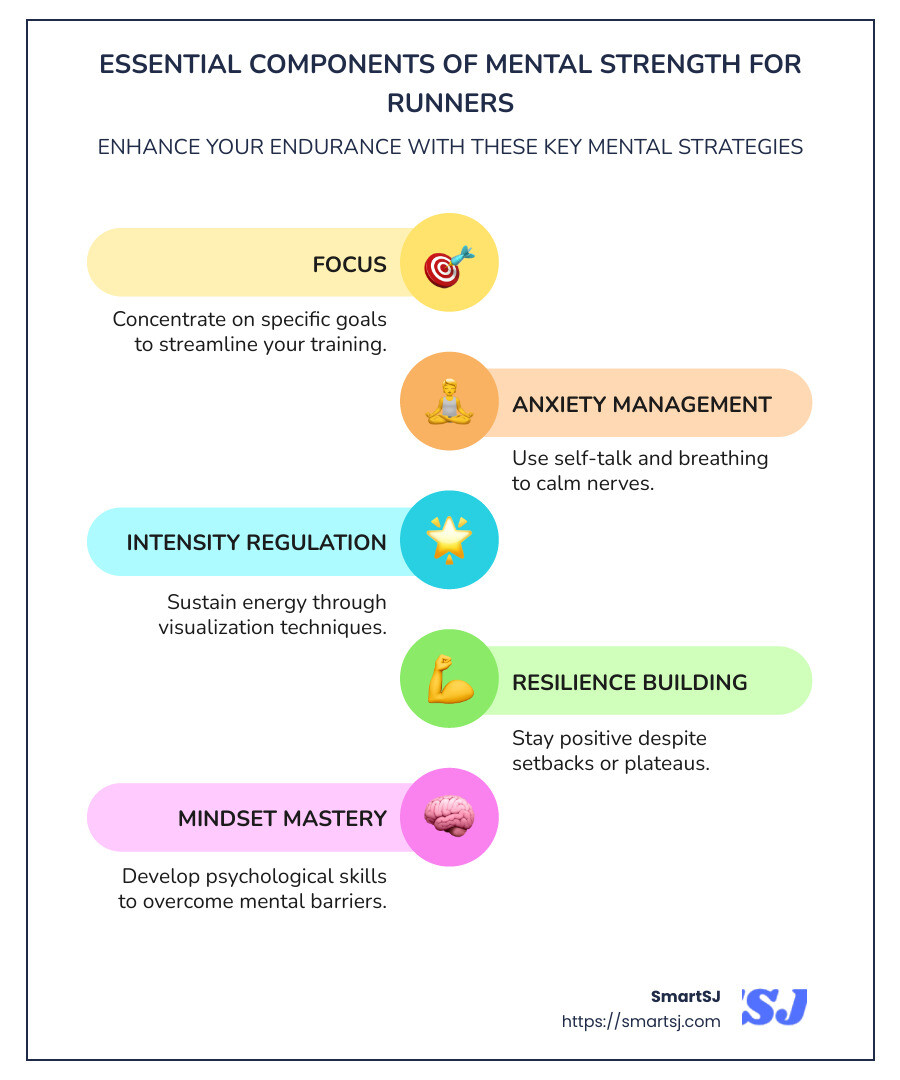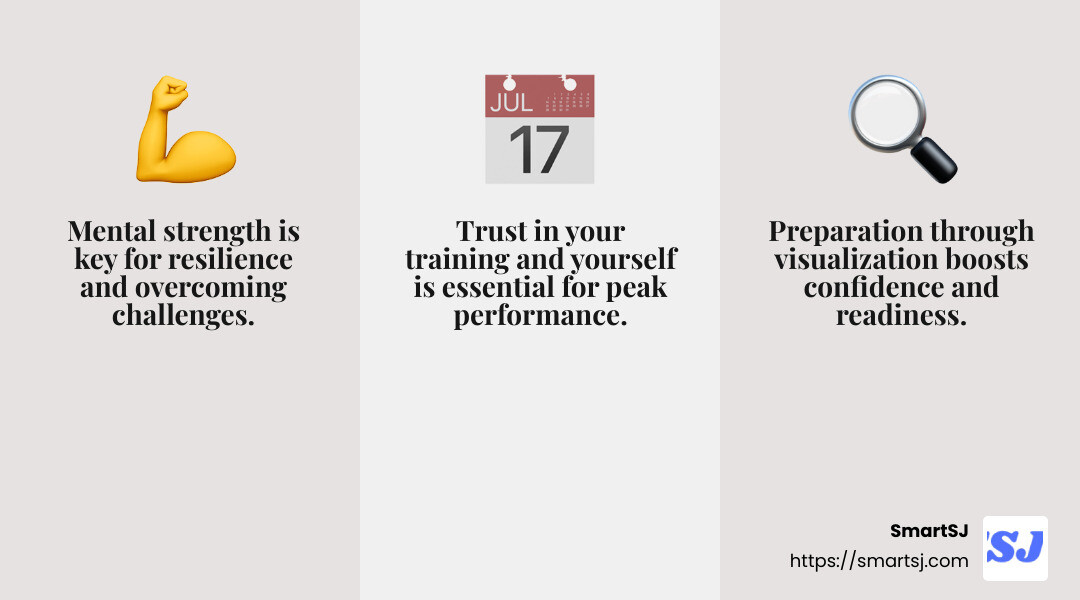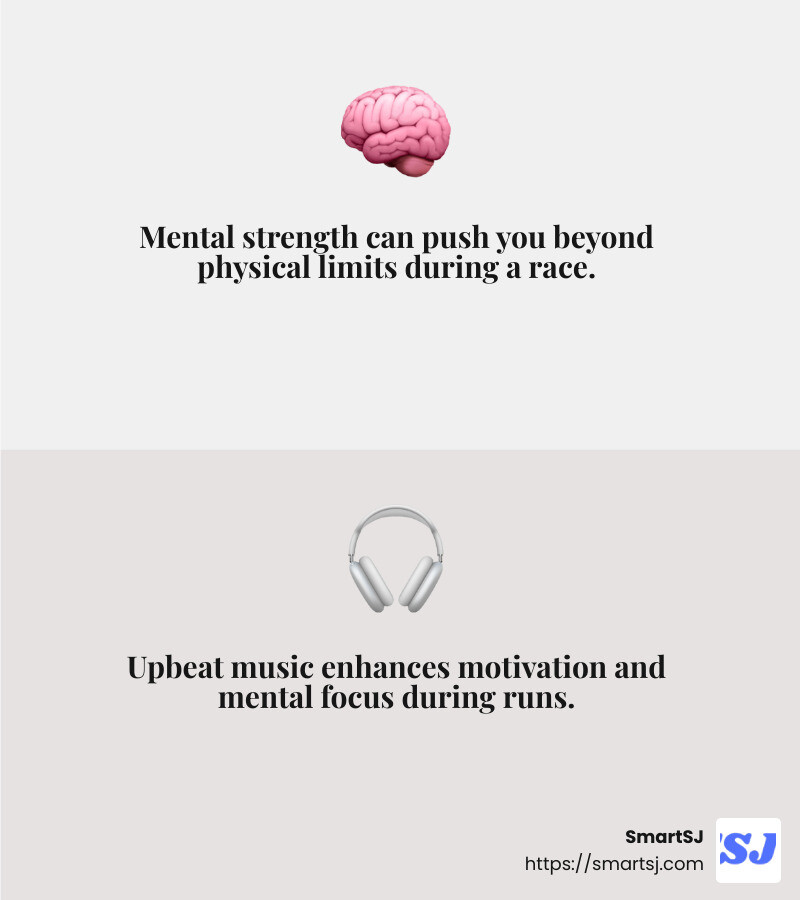When it comes to running, mental strength for running is just as vital as physical endurance. Picture standing at the start line, your heart racing not just from the anticipation of the miles ahead but also from the mental problems that might appear. Here’s a quick snapshot for those in search of immediate insights on mental strength for running:
- Focus: Concentrate on specific goals to streamline your training.
- Anxiety Management: Use self-talk and breathing to calm nerves.
- Intensity Regulation: Sustain energy through visualization techniques.
- Resilience Building: Stay positive despite setbacks or plateaus.
Developing mental toughness means becoming adept at handling these challenges with psychological skills and mindset mastery. Samuele Marcora, an expert in exercise physiology, reveals that mental barriers often outweigh physical ones in endurance sports. Imagine that—the drive to keep going can be shaped more by your thoughts than your muscles.
At Smartsj, we’re committed to helping you improve mental strength for running. With a strong foundation in cognitive strategies and cutting-edge psychological insights, we provide runners with effective tools to push past limits and achieve new personal bests.

Importance of Mental Strength for Running
Running is not just about legs moving fast; it’s about the mind steering the journey. To excel, runners need more than just physical endurance. They need a mental strength for running that includes resilience, focus, and trust in their abilities.
Resilience
Resilience is like a runner’s safety net. It helps you bounce back from setbacks, like injuries or disappointing race results. According to research by Marcora and Staiano, mental resilience can often dictate how far you can push yourself, even when physically exhausted.
Key Tip: Break big goals into smaller milestones. Celebrate each achievement to build a resilient mindset.
Focus
Focus is the laser beam that guides runners through the noise. By honing in on specific objectives, runners can cut through distractions. This is crucial during long runs or races when the mind can wander.
Example: Elite athletes often use visualization to maintain focus. They picture themselves crossing the finish line, which helps them stay on track.
Strength
Mental strength is about more than just muscle power. It’s the inner grit that keeps you moving forward. Graham Jones, a sports psychologist, notes that top performers thrive under pressure by using their mental strength.
Remember: Strength is as much about mental fortitude as it is about physical prowess.
Preparation
Preparation is the groundwork for confidence. Knowing you’ve trained well boosts your mental state. It’s like having a secret weapon on race day.
Pro Tip: Regularly visualize your race plan. Imagine the route, your pace, and how you’ll tackle each mile.
Vision
Having a clear vision is like having a map for your running journey. It helps you set long-term goals and keeps you motivated.
Advice: Create a vision board with your running goals. Keep it where you can see it daily to inspire your journey.
Openness
Being open to new strategies and feedback can improve your performance. It allows you to learn from every run, whether it’s good or bad.
Action Step: After each race, jot down what worked and what didn’t. Use this feedback to improve future performances.
Trust
Trust in yourself and your training is essential. It builds confidence, which can be a game-changer on race day.
Insight: Repeat positive affirmations, like “I am a strong, mentally tough runner,” to boost self-belief.

Building these traits into your running routine transforms challenges into opportunities. Developing a strong mental game is just as crucial as physical training. With mental strength for running, you’ll find yourself not just running faster, but running smarter.
Next, we’ll explore practical exercises to bolster your mental endurance.
Building Mental Strength for Running
Developing mental strength for running is like building a toolbox for your mind. It’s about having the right tools to handle any challenge on your running journey. Let’s explore some key components: positive self-talk, mindfulness, mental exercises, visualization, and goal setting.
Positive Self-Talk
Positive self-talk is your inner cheerleader. It’s the voice that says, “You’ve got this!” when the going gets tough. Research highlights that athletes who use positive affirmations perform better because they boost confidence and reduce anxiety.
Try This: Create a list of positive phrases like “I am strong” or “I can do this” and repeat them during your runs.
Mindfulness
Mindfulness is about being present in the moment. It helps you focus on your breathing, your form, and the rhythm of your steps. According to Jessica Skye, mindfulness can improve your running by making you more aware of your body’s signals.
Exercise: Practice mindful breathing. Pay attention to each inhale and exhale as you run. This can help calm your mind and improve your performance.
Mental Exercises
Mental exercises are like workouts for your brain. They help build resilience and focus. Techniques like the Pomodoro Technique can improve concentration by breaking tasks into manageable chunks.
Tip: During a run, set small milestones. Focus for a few minutes, then relax. This rhythm keeps your mind engaged and reduces fatigue.
Visualization
Visualization is about seeing your success before it happens. Elite runners often visualize crossing the finish line or tackling a challenging hill. This mental rehearsal prepares your mind and body for the real event.
How To: Spend a few minutes before each run imagining the route, your pace, and the feeling of accomplishment at the end.
Goal Setting
Setting goals gives you a target to aim for. It transforms vague aspirations into concrete plans. Breaking down big goals into smaller, achievable steps makes them less daunting and more attainable.
Action Plan: Write down your running goals, both short-term and long-term. Track your progress and celebrate each milestone to stay motivated.
These components of mental strength for running are powerful tools. They can transform your running experience, helping you to run not just with your legs, but with your mind.
In the next section, we’ll dig into techniques to further improve your mental toughness.
Techniques to Improve Mental Toughness
When it comes to running, mental toughness can be your secret weapon. It’s not just about physical endurance; it’s about training your mind to stay strong and focused. Let’s explore some practical techniques that can help you build this critical skill.
Mantras
Mantras are powerful phrases you repeat to yourself to inspire and motivate. They can boost your mental strength by keeping your mind focused and positive. Think of them as your personal pep talk during a challenging run.
Example Mantras:
- “I am strong and capable.”
- “Every step makes me stronger.”
- “I accept the challenge.”
Repeating these during your runs can help drown out negative thoughts and keep you on track.
Mental Strategies
Adopting mental strategies is about actively managing your thoughts and emotions. This could involve setting mini-goals during a run, or breaking your route into smaller sections to make it more manageable.
Tip: Use mental games to distract yourself from fatigue. For instance, count your steps or focus on your breathing pattern. This keeps your mind busy and helps you push through tough spots.
Self-Regulation
Self-regulation is the ability to control your emotions and impulses. It’s a key aspect of mental toughness. By practicing self-regulation, you can maintain focus and composure, even when the going gets tough.
Practice: Start by identifying what triggers negative emotions during your runs. Then, develop strategies to manage these triggers, like deep breathing or focusing on positive outcomes.
Anxiety Management
Anxiety can be a runner’s worst enemy, but learning to manage it can boost your performance. Techniques like deep breathing, mindfulness, and visualization can help calm your nerves.
Try This: Before a race or difficult run, take a few minutes to practice deep abdominal breathing. Inhale deeply, hold for a few seconds, and exhale slowly. This can help reduce anxiety and prepare your mind for the task ahead.
Confidence Building
Confidence is a cornerstone of mental toughness. Building confidence involves celebrating small victories and learning from setbacks. It’s about believing in your abilities and trusting your training.
Strategy: Keep a running journal. Document your achievements, no matter how small, and review them regularly. This will remind you of your progress and reinforce your self-belief.
These techniques are like mental workouts that strengthen your resolve and improve your running experience. By incorporating mantras, mental strategies, self-regulation, anxiety management, and confidence building into your routine, you’ll be well on your way to mastering mental strength for running.
In the next section, we’ll explore practical exercises that can further fortify your mental endurance.
Practical Exercises for Mental Endurance
Building mental strength for running isn’t just about thinking positive thoughts—it’s about practicing specific exercises that improve your mental endurance. Let’s explore some effective techniques you can start using today.
Mindfulness Meditation
Mindfulness meditation helps you focus on the present moment. It’s a great way to clear your mind and reduce stress before a run. By practicing mindfulness, you can improve your concentration and keep negative thoughts at bay.
How to Practice:
- Find a Quiet Spot: Sit comfortably and close your eyes.
- Focus on Your Breath: Pay attention to each inhale and exhale.
- Acknowledge Thoughts: If your mind wanders, gently bring your focus back to your breathing.
Try this for just 5–10 minutes daily to start seeing benefits in your running performance.
Breathing Techniques
Breathing efficiently can make a huge difference during a run. Proper breathing helps maintain your energy and reduces the feeling of fatigue.
4-7-8 Breathing Technique:
- Inhale: Breathe in quietly through your nose for 4 seconds.
- Hold: Hold your breath for 7 seconds.
- Exhale: Exhale completely through your mouth for 8 seconds.
This technique can calm your mind and body, making it easier to tackle long distances.
Mental Recaps
After a run, take a moment to reflect on your performance. This mental recap helps you learn from each experience and build on your strengths.
Steps for a Mental Recap:
- Identify Successes: What went well during your run?
- Note Challenges: What obstacles did you face?
- Plan Improvements: How can you overcome these challenges next time?
Writing these down can reinforce positive habits and strategies.
Distraction Methods
Sometimes, the best way to push through a tough run is to distract your mind. Distraction methods keep you engaged and help you manage discomfort.
Examples of Distraction Methods:
- Counting Steps: Focus on the rhythm of your steps to take your mind off fatigue.
- Visualize Success: Picture yourself crossing the finish line or achieving your goals.
- Play Mental Games: Challenge yourself with math problems or word games.
These exercises can make your runs more enjoyable and less daunting.
By incorporating mindfulness meditation, breathing techniques, mental recaps, and distraction methods into your routine, you’ll improve your mental strength for running. These practices are simple yet powerful tools that can transform your running experience.
Frequently Asked Questions about Mental Strength for Running
How to be mentally stronger when running?
Being mentally strong while running is all about using mindfulness, practicing positive self-talk, and using distraction techniques. Imagine you’re on a long run, and negative thoughts start creeping in. This is where mindfulness comes in. Focus on your breathing or the rhythm of your feet hitting the ground. This keeps you grounded in the moment and helps push away negativity.
Positive self-talk is your internal cheerleader. Replace thoughts like “I can’t do this” with “I’m strong and capable.” This shift in mindset can change your entire running experience.
Distraction can be a powerful tool. Some runners count their steps or listen to upbeat music to keep their minds engaged. It’s like giving your brain a task to focus on, which can make the miles fly by.
How important is mental strength in running?
Mental strength is crucial in overcoming obstacles and facing race day challenges. According to research by Professor Samuele Marcora, our performance in endurance sports is not just about physical ability but also about how we perceive effort and our motivation levels. This means that even when your body feels exhausted, your mind can push you further.
On race day, mental strength helps you tackle unexpected challenges, like bad weather or a faster-than-expected pace. It keeps you focused on your goals, even when things don’t go as planned.
What are ways to build a runner’s mental strength?
Building mental strength involves a mix of form technique, upbeat music, and motivation. Pay attention to your running form; it’s not just about efficiency but also about confidence. A strong posture can make you feel more powerful and capable.
Listening to upbeat music can give you an extra boost. A good playlist can lift your mood and keep you motivated, especially during tough runs.
Finally, find what motivates you. Whether it’s a personal goal, a running buddy, or a finish line medal, keep that motivation front and center. Visualization techniques—picturing yourself achieving your goals—can also improve your mental strength for running.

By integrating these strategies into your training, you’ll not only improve your mental toughness but also enjoy running even more.
Conclusion
Building mental fitness is just as crucial as physical training for runners. It’s the secret sauce that can transform an ordinary run into an extraordinary achievement. Mental strength for running is about resilience, focus, and preparation. It helps you push through those tough moments and keep your eyes on the prize.
At SmartSJ, we believe in the power of mindset training. Our mission is to provide you with the tools and techniques to improve your mental game. From mindfulness exercises to positive self-talk, we offer a variety of resources to help you build a strong mental foundation.
Think of mindset training as a performance multiplier. It takes your existing abilities and amplifies them, helping you achieve more than you thought possible. The benefits are substantial, with virtually no downsides. By investing in your mental strength, you’re setting yourself up for success not just in running, but in all areas of life.
Ready to strengthen your mind for the long run? Visit our mental strength page to explore more resources and start your journey today.
Every step you take towards building mental strength is a step towards becoming the best version of yourself. Keep pushing, stay positive, and accept the power of your mind.










